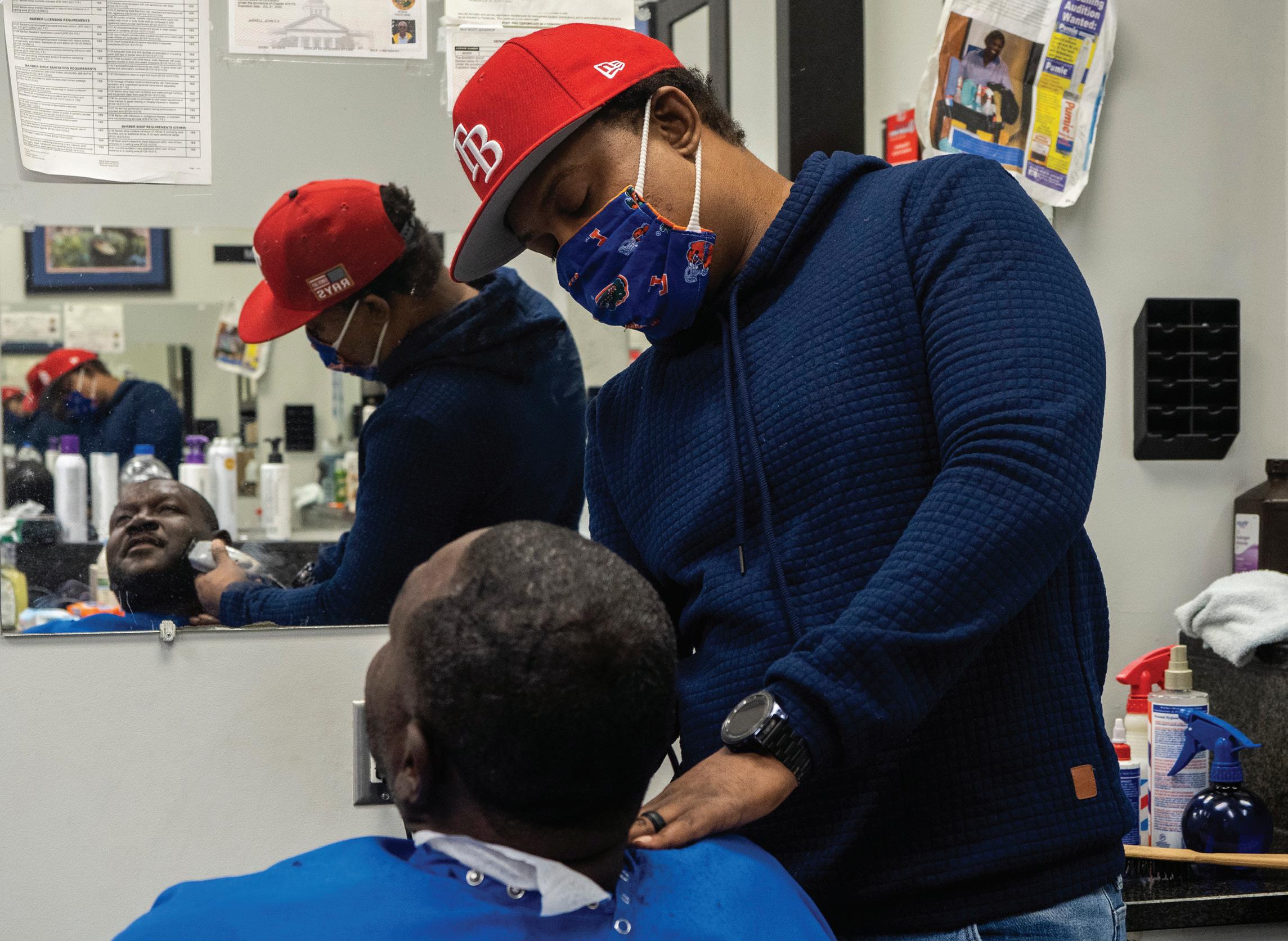
12 minute read
Florida Gator this season
MONDAY, NOVEMBER 2, 2020 www.alligator.org/sports
FEATURE Joe Pagdin begins Florida career five years in the making
Advertisement
By Michael Hull Sports Writer
Nervous. That’s how I felt the first time I interviewed Joe Pagdin.
Pagdin was in eighth grade at the time and was already the No. 1 player on the varsity golf team at Trinity Preparatory School in Orlando. I was intimidated as a freshman about to conduct my first interview for the high school newspaper. Little did I know, Pagdin would commit to Florida a month later at 13-years-old — the youngest golf commit in UF history.
That was five years ago. Back then, Pagdin was the smallest kid on the varsity team.
“I feel when I go to matches, most of the time, I feel like the other team is looking at me like, ‘Oh, who’s this little kid?’” the young, pimple-faced Pagdin said.
Now, Pagdin is the proverbial big man on campus as he begins his much-anticipated career at UF.
“For me, it was the right choice and the right timing,” Pagdin said of his commitment. “After I committed, the wait seemed like it was going to take forever, and it did. And then my senior year just flew by, and soon enough, I was moving up here.”
Joe’s father, Mark Pagdin, realized his son could have a collegiate future in golf when he was very young.
“When he was eight, nine, 10 years old, he used to win everything on the junior level,” Mark said. “People used to say to me that ‘You know what? He'll go to a Division I school, he'll get a top scholarship,’ and I was paranoid because I grew up in England, so I didn't know the system over here.”
Mark said Joe received offers from smaller schools when he was 11 or 12. When he committed to Florida, Pagdin had 10 offers on the table.
One of the biggest pieces that drew the Pagdins to Gainesville was head coach J.C. Deacon. Joe has a long relationship with Deacon, having known him for more than five years. While Deacon is now considered part of Joe’s family, Mark’s meeting with Deacon won the Pagdins over for good.
Deacon met Mark at 8 a.m. on a Friday.
“And he walked in, J.C., and he looked like shit,” Mark said. “He's got black eyes and a beard, and I say 'Jesus.' I said, 'have you been up all night drinking?'"
Deacon had actually been in the hospital all night with Gordon Neale, one of his players at the time. Neale had fallen off his bike and broken his arm, and since he was from California, his parents could not make it to the hospital. So Deacon went and spent the night with his player.
“(Joe) was also looking seriously at Auburn,” Mark said. “If anything happens like an accident, or something happens, you need to be within a couple of hours drive rather than eight hours drive.”
Mark said that while Deacon was always Joe’s first choice, he sealed the deal when that happened.
Joe says Deacon is different from most college coaches since he’s a competitive golfer in his own right and competes in individual tournaments. He does all the workouts the players do, which Joe says inspires the team always to be its best.
“Coach Deacon is more than just my golf coach,” Joe said. “For me, looking up, J.C. is a role model.”
Joe joined a Gators team looking to meet high expectations. This year’s team is full of talent, notably young talent: The Gators have just four upperclassmen on the 13man roster. However, Joe believes the apparent lack of experience won’t hurt them as they have multitudes of experience in other high-level events.
Many on the team, including Joe and sophomore Ricky Castillo, have played in national and international events for years now. Castillo played in the U.S. Open, a professional major championship, in September. Freshman Tyler Wilkes represented the U.S. in the 2019 Toyota Junior World Cup. Joe played in big team events throughout high school, including when he represented the Great Britain National Team in the Youth Olympics in 2018.
“I think the standard of our experience and our maturity will take over the fact that we’re young,” Joe said. “But we’ll see. You know, there’s going to be some learning curves out there. And I’ve got things to learn; everyone’s got things to learn.”
While youth defines the roster, lack of experience certainly doesn’t. Castillo possibly has the most experience on the team despite being a sophomore. Besides his U.S. Open appearance, Castillo also played in the 2018 Junior Ryder Cup. Once he came to Gainesville, Castillo immediately made his name known, winning the 2020 NCAA Division I Phil Mickelson Outstanding Freshman Award, given to the nation’s top college freshman.
Joe and Castillo have known each other for a long time. They both committed around the same time and used to room together at amateur events, such as the Sage Valley Invitational. They also play practice rounds together as often as they can.
“Ricky’s taught me a lot of things, being a year older. He’s a great kid,” Joe said. “Our friendship and our competitiveness will both push us to be better.”
Castillo, Joe and the rest of the Gators have embarked on one of the most unusual seasons ever. Due to the COVID-19 pandemic, this season was shortened to just three conference-only events per team.
Because of the virus, Joe was unable to travel to England to compete in the British Amateur this summer as he has done in years past. Instead, he golfed with friends, enjoying the sport without the pressures of intense competition. However, Joe was relieved to get back to competitive golf this fall with the Gators.
“All we want to do is play,” Pagdin said. “So, we can do anything about that.”
Joe and the Gators began their season at the Blessings Collegiate Invitational Oct. 5-7. The men’s team did not have the start they were looking for, finishing 12th out of 14 teams. They improved greatly at the Vanderbilt Legends Collegiate, finishing in a tie for fourth. The team has one tournament left, the Jerry Pate National Intercollegiate, on Nov. 9 and 10.
This season overall, Joe wants to do two things: win and keep his spirits high.
“I’m just looking to go out there and be super confident, super positive,” Joe said. “I just want to go out every day and play as good as I can with the best attitude I can.”
While this season is the priority, Joe has his future to consider. He acted and spoke like a pro even when he was 13 years old, which makes sense considering he has been on the PGA Tour radar since before then. The current PGA landscape is run by young players, such as Viktor Hovland, Matthew Wolff and Colin Morikawa.
Joe sees these players as examples to follow. Hovland and Wolff were teammates at Oklahoma State University, while Morikawa played at Cal Berkeley. They all spent multiple years in college, which Joe believes helped them become better pros. He thinks that some people who turn pro too early lack the discipline to be on their own on tour. Joe believes young stars like Morikawa have more confidence after staying in school.
“They’re ruthless, you know? They have no fear. They have nothing to lose. And that's dangerous for other players,” Joe said. “I don’t see the point in rushing it.”
In preparation for the next chapter of his career, Joe looked back on all that has happened since our first interview five years ago. The biggest thing he has learned, he said, is how to adjust his attitude.
“I didn't have the best of attitudes when I was younger, and I changed that,” Joe said. “And now, I go and I enjoy playing golf, no matter for what it is. Whether it's at 8 p.m., or if it's at 6 in the morning. You've got to enjoy what you're doing.”
Five years ago, Joe was just a small eighth-grader with dreams of playing collegiate golf.
“My goal is to go to college, SEC or ACC,” young Joe said. “Four years at college, then hopefully turn pro.”
Now? He is one of the top freshman golfers in the country, finishing in the top 30 in each of Florida’s first two fall events, and he is well on his way to achieving that goal of turning pro.
mhull@alligator.org @Michael_Hull33
Courtesy of The Trinity Voice
Joe Pagdin first committed to Florida when he was 13 years old. Now, five years later, he is well on his way to making his mark on the UF golf program.
Gators volleyball set a school record for blocks in a three-set match, recording 19.5 blocks against Alabama Saturday afternoon. Junior Lauren Dooley was responsible for 10 of them.
Follow us for updates
For updates on UF athletics, follow us on Twitter at @alligatorSports or online at www.alligator.org/sports
Remember the Titus J ade Caraway is an excellent Division I softball player. The now-senior center fielder started her career at NC State, where she led the team in batting average (.389) and the ACC in total hits her freshman year. In her sophomore season for the Wolfpack, Caraway trumpeted a perfect stolen base percentage, finishing 13 for 13 on the season. So you want to talk about sexism in sports?
She made an immediate impact upon transferring to the SEC. Caraway scored the game-winning run for Florida seven times in her first season. Last year, she managed a seven-game hit streak in a shortened 27-game season. Luckily for Florida, Caraway decided in April to use her extra year of eligibility, granted by the NCAA in response to the COVID-19 pandemic, and return to Katie Seashole Pressly Stadium for one last season.
But, sure, as her boyfriend and Gators quarterback Kyle Trask said, “She’s got a nice little arm.”
Now, I know I can’t speak for Caraway, but I would have smacked my boyfriend upside his head if he went in front of 20-something reporters and told them that I write “nice little stories for The Alligator.”
I talk a big game about “supporting women in sports” on social media, and that’s usually in the context of sports media specifically. However, I’d be remiss if I didn’t use my platform to confront the sexism female athletes face on a day-to-day basis as well.
About six-and-a-half minutes into the third quarter, the SEC Network announcers for Saturday night’s game decided to circle back around to this Caraway-Trask narrative.
For some context, the Gators’ COVID-19 outbreak forced them to pause all teamrelated activities for two weeks, and that meant no practice. When you’re a Heisman candidate, you can’t afford to stop moving and let the rust corrode your momentum. Naturally, Trask called on Caraway to help him stay in shape. As a fellow Division I athlete and an outfielder, of course she’d be able to hold her own. Same idea — throw, catch — different ball.
But Saturday night’s commentators didn’t show similar faith in Caraway. In fact, her name was never even mentioned by either man in the booth.
“I mean, Kyle Trask was literally, to keep his arm loose, was throwing to his girlfriend who’s a center fielder on the softball team,” one announcer said over the laugh of another. “I mean, you know, I’m sure she’s a great athlete, but she probably can’t catch the velocity of the throws that he likes to throw to his normal receivers.”
Before I get into exactly why these comments were wildly inappropriate, here’s some quick science to debunk the claim that Trask throws too fast of a ball for Caraway to handle.
Quarterback throws in the NFL typically don’t reach 60 mph, according to USA Today Sports. At the NFL Combine, Russell Wilson threw a football 55 mph. Nick Foles’ throw reached 57 mph and Kirk Cousins’ topped out at 59. An NFL regulation football weighs about 14 to 16 ounces.

The average overhand throw in Division I softball clocks in at about 57 mph, according to the National Fastpitch Coaches Association. A 12-inch regulation softball weighs 6.25 to seven ounces.
Needless to say, Caraway probably did just fine throwing the pigskin around with her boyfriend.
I was texting my dad after I got a message from one of my editors explaining what just happened, since I was in the press box in The Swamp and unable to hear these remarks live. “That was weird, right?” my dad asked, rhetorically. “Maybe Payton the uniforms threw them off and they forgot what year it was.” Titus
As much as I’d like to believe the throwback uniforms were to Twitter: @petitus25 blame, there are so many blatant examples of women in sports Email: ptitus@alligator.org being defined by their significant others, their sexuality or some other viciously sexist stereotype.
Katinka Hozzu, also known as “The Iron Lady” of the swimming world, destroyed the 400-meter individual medley world record in the Rio Olympics four years ago. Hozzu just reached the pinnacle, the absolute zenith of her sport, and the camera cut to her now-ex husband and coach at the time.
“There’s the man responsible for turning his wife into an entirely new swimmer,” NBC commentator Dan Hicks touted.
Not “the man who helped,” but “the man responsible.”
Another heartbreaking example of blatant sexism in sports is the hypersexualization of track and bobsled Olympian Lolo Jones.
In the 2008 Olympics, Jones failed to medal in the 100-meter hurdle event after tripping over a hurdle during the race. The New York Times published an article, effectively kicking her, rather hard, while she was down. It claimed that Jones “played into the persistent, demeaning notion that women are worthy as athletes only if they have sex appeal.”
“Essentially, Jones has decided she will be whatever anyone wants her to be — vixen, virgin, victim — to draw attention to herself and the many products she endorses,” the article read.
No one would ever write that about a male athlete. Ever. Regardless of how many workout videos Jaguars quarterback Garnder Minshew posts in cut up shorts and tank tops, no major media outlet has published a story casting such claims on him.
Imagine that you work your whole life for this Olympic moment, falter and then see your name in The New York Times explaining that all you are is a sorry excuse for a sex symbol.
These all too casual instances of sexism in sports are, frankly, disheartening. I remember being so excited when I became one of The Alligator’s softball beat writers last spring. Collegiate softball is a women’s sport with lots of deeply moving storylines and national attention.
The women I covered on this beat aren’t girlfriends with “nice little arms.” They’re commanding athletes in their own right.
And it’s about time they’re referred to as such.



